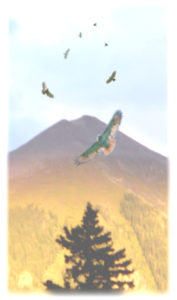People say that what we are all seeking is the meaning for life. I don’t think that’s what we’re really seeking. I think what we’re seeking is an experience of being alive.
—Joseph Campbell, in an interview with Bill Moyers
As Bob Dylan said in one of his songs, “I’m a poet. I know it. Hope I don’t blow it.” Well as a healer I could say the same thing. “I’m a healer. I know it. Hope I don’t blow it.” My ditty doesn’t rhyme as nicely as Dylan’s, and being a healer may be a bit more dangerous than being a poet, though many a poet would say differently.
So what matters in my little corner of the healer’s art?
First and foremost of course is love. Love such that even on my worst days, I can be there for another unconditionally, without judgment, and hopefully with the discernment that comes from seeing through the eyes of love. A love that’s not so afraid of the dark, that desires to bring into the safety of that loving every uncomfortable, obnoxious, angry, frightened part of you, of me, of our common humanity.
The etymological root of the word “heal,” literally means “to make whole.”
To recognize and befriend our lost, abandoned and exiled parts. To include rather than exclude. To make whole.
In traditional shamanism there is the concept of soul loss and soul retrieval, when someone has “lost” an essential part of themselves. Whether through trauma, abuse, emotional overwhelm, learned helplessness, or just plain sudden change that we had no way of processing, a part of us had to go into hiding in order to protect us. In modern psychology, soul loss might fit within a spectrum of dissociative disorders.
Personally, I prefer to perceive the soul as a spiritual reality within us that cannot be lost or stolen. It’s a resource of love that doesn’t need to be earned or deserved, there is no test to pass, nothing to prove. And when we are connected to that state of grace we just feel safer.
Which brings us to the subject of self-abandonment.
Matt Licato, co-creator with Jeff Foster of the Befriending Yourself program, made this comment in a conversation about shame and anger: “We’re orbiting around one of love’s lost children wanting to come home.”
The “orbiting” here refers to how we instinctively pounce on ourselves with a sticky storm of stories of shame and blame, problems and solutions, but in ways that only continue to send messages of threat and abandonment to that child.
In many ways, the job of “soul retrieval” is to provide shelter, comfort, protection and companionship to love’s lost children, until they feel safe enough to come home. Of course then the job requires that within ourselves we build a safe place for that abandoned part.
The abandoned parts initially, and even fundamentally, don’t need insight and clarity as much as warmth, an unconditional gaze of inclusion, an embrace, even if just for a moment. It’s a welcoming, an invitation, a message that we’re sending to the abandoned child that we love her and we have a safe place for her in our home, in our body, a place where it’s safe to feel life and safe to breathe. We welcome her back without any requirement that she be healed to be worthy. We welcome her so she can be held. We welcome her because she is part of who we are.
Insight and clarity have great value, but the self-abandoned one behind the locked door first needs warmth and safety to be willing to crack the door open.
A baby can’t really protect himself via flight or fight (except with crying). And according to polyvagal theory, if the safety of warmth, love, and agency aren’t available, the most ancient and primitive part of our survival mechanisms, the unmyelinated primitive vagus system which governs immobility and shutdown takes over. The primitive vagus nerve connects our brain to almost all of the internal organs and is the second largest nerve in the body, comparable in size to the spinal cord. When it says freeze, we freeze.
Self-abandonment needs to be met in a field of safety. Through whatever means we use to provide a felt sense of safety to “love’s lost child,” the process takes time and consistency. It’s like patiently befriending a wild animal with a history of abuse and starvation. It takes time and consistency to gain trust.
In shamanism, as well as Depth psychology, there is a respected archetype of the wounded healer; that a true healer must be deeply wounded herself, and through the wound she must learn the landscape and territory of her own healing. This experience is what she brings to help others heal. She has trained herself to bring the safety of belonging to the most unsafe places of the psyche.
There are some “go to’s” that help me when I’m spinning and hurting and I’m urgently wanting to step off the not-so-merry-go round, or at least benefit from the rocky experience. As a “wounded healer,” these basics are also essential to my work with others.
One big go-to is to slow down. Really, really, really slow down. And somewhere within the breathing space of slowing down, I give myself permission to do nothing. Really. Nothing. Just for a little while.
Doing nothing gives me a transitional space to sense the present moment, to gently lean in, to feel, explore, and bring acceptance to the honest sensations of “love’s lost child.” Just long enough for the sensations to be recognized rather than rejected. Just long enough for the beginnings of trust and safety to be offered. Just long enough to hold the aching heavy heart, the constricted breath, the tight throat, the awkwardness, the claustrophobia, in a soft warm embrace.
There’s a sweet spot between drowning (traumatic arousal) and avoidance and repression (“I don’t want you here you awful shitty thing!”), where we’re more able to offer, however shaky and tentatively, some gesture of friendship, a willingness to feel the hurt under the abandonment. However, when the war is fully raging inside it’s often impossible to “lean in” with self-compassion, even with mindfulness, definitely not friendliness. No way. At the moment, there’s too much sense of danger and our mindful thoughts have become weapons of war. If we try too hard to “do the right thing,” the war just escalates.
We first need to slow down enough to step off the battlefield. We need to slow down in the body and let the mind follow.
Personally, I’ve become very fond of slowing down. In slow time I can better sense, ride, and occasionally even guide the quirky tides of my being, my common, complicated fumbling humanity.
In slow time I can better sense and synchronize with the rhythm and breath of my body and soul.
In this moment I am safe enough for danger.
In this moment I am safe enough for emotions.
In this moment I welcome my noisy mind.
In this moment I welcome the ragged one.
In this moment I welcome
shame and humility,
ego and soul,
terror and courage.
In this moment I am safe enough for joy and grief.
In this moment I am safe enough for silence.
In this moment I am safe enough for love and wonder.
Welcome home.

